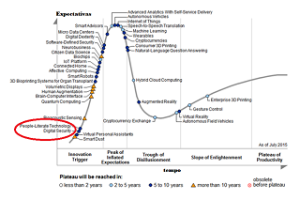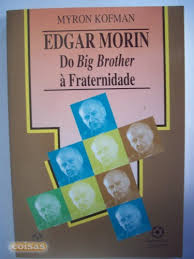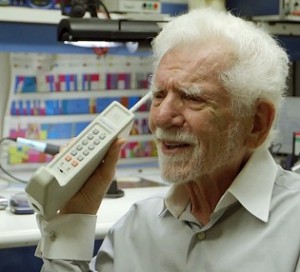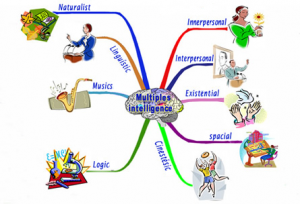
Arquivo para a ‘Cognition’ Categoria
Technology-People Literacy (TPL)
This is Technology-People Literacy (TPL), which would in Portuguese TAP, but do not know whether to take exactly that.
Literacy (TPL), which would in Portuguese TAP, but do not know whether to take exactly that.
The truth is that for the first time it appeared in the famous Gartner hipociclo starting the curve of expectations, and also that appears next to security concerns.
One of the important things to know the point that a particular technology is a hipoclico curve is to understand what exactly does “literacy” (or learning) at one time as expected and maturity within that curve, for example, until the early 1990 meant nothing the Web, cell phones were too large for the pocket, Google only appeared in 1998 and precisely in this period a metadata system called Dublin Core was appearing until 2003 there was MySpace and Youtube was launched only two years after this.
Thus, tools are created, developed and worked as the time in 1995 was basic to work with word processing and spreadsheets, but today there are more sophisticated tools and spreadsheets have developed where you just know what are the fields to be filled, the word processors have correction tools, custom comments and even own vocabularies for certain contexts.
Set “literacy” or digital learning means now, since it entered the Gartner hipociclo curve (in 2015) something designated as PLT (People-Literate Tecnology), which means a richer and more complex definition of literacy for example, the University of Colorado has defined putting many topics to consider this complexity: communicate, solve problems, Access, manage, integrate, evaluate, design and create information to enhance learning in all areas, and ultimately, acquire knowledge over life and 21st century skills.
Note that two items refer to Communication and Information, another to solve problems and a quarter what it means to acquire knowledge in the 21st century.
Are we reading minds ?
A device size of a matchstick that reads thought, called stentrode was developed by researchers at the University of Melbourne (Australian) with a test done on animals to test the ability of neural signals and convert them into electronic signals.
developed by researchers at the University of Melbourne (Australian) with a test done on animals to test the ability of neural signals and convert them into electronic signals.
The initial idea is to use the device to move a bionic arm for example, and would be easily implanted and not being invasive (would be implanted in the neck of a patient and positioned in a blood vessel), as the doctor said Terry O’Brien, Department of Medicine and Neurology at the University and a member of the research team.
O’Brien said:. “The great innovation is that we now have a minimally invasive brain-computer interface device that is potentially practical for use in the long run” as news on the university website that announced the stentrode.
Current methods to access precise brain signals require complex surgery with opening the skull and become less effective after a few months, the control signals of unreliability.
The stentrode is less invasive because it is attached to a vein in the neck and therefore easier maintenance.
Will the future be able to read thoughts and communicate by brain signals?
Fundamentalisms, worlds and science
The fact known to scientists, thinkers, philosophers and also some theologians, that Western thought is experiencing a crisis is a fact, what would be its roots is another problem.
theologians, that Western thought is experiencing a crisis is a fact, what would be its roots is another problem.
Much of the thinking, to our correct view is that the basis of this error is the foundation of the Western Enlightenment thought it was idealism, not how they think the fundamentalists and nostalgic (right and left as Bauman) who claim that it is a crisis of modernity, but it was born of the Enlightenment and idealism, so is there a base.
Umberto Eco wrote a nice article: “Ciência, erro e fundamentalismo” (Science, error and fundamentalism) in which states:
“The problem is that much of the criticism of the ideology of progress (or the so-called spirit of the Enlightenment), the spirit of science is often identified with certain idealistic philosophies of the century. XIX, according to which history is directed always for the best, or the triumphant realization of itself, spirit or other life force that is always in motion toward a good end. ”
All developmental vision, “critical” to the objects as “disturbing” the subject, is what Bruno Latour calls “hell´s dichotomies” because it is in the marrow of Western thought, in which the naive fundamentalist thought is the most radical.
Bruno Latour in his book never been modern unveils major gossip illogical, a-scientific and fundamentalists, created a concept called symmetrical anthropology, in which he analyzes it is not dialogues between “areas of knowledge”, but among world such as: “Amerindian and modern science” and other “hybrid” issues that actually speak of different worlds and not areas of knowledge.
This applies to the network because the anthropological knowledge networking, there is therefore a dilution of the idea of authorship, where the multiplicity.
Being, philosophy and techniques
In several post already pointed out the question of Being, the philosophical  tradition of the Middle Ages I pointed out as the main object of philosophy, but to date we could say that is the being as being, well modernity sought this as the foundation of all beings. So it looks like we’re looking for answers like, because I exist? Who am I and why do these questions? but in fact the problem is because asking questions? Because out of your being is the other and stuff, and that’s where the man makes the experience of Existence, and this condition of all men are subject, so the relationship with others and with things develop a set of skills and “Technical” external. Understand the world and the relationship with others from my “know” and this means any such thing in my existence that is outside of me, in others and in things, so the philosophy is not simply think, but the discovery of existence and this can become aware. So there is only consciousness is something out of me, said the philosopher Edmund Husserl, consciousness is consciousness of something, and therefore it is impossible to have it without any technique, I venture to say that the technique is inherent in this consciousness to admit language such technology, that is, the technique with logos, according to a rationality. Thus philosophy is not only think, is the way of existence discover techniques that make this life more aware, happier and subsisting and then connected to how we exist. The biggest mistakes of philosophy is to distance it from the other while being and of things as object exists, I cause we are for each other and we exist because we have relationship with all things, including the language in these things, techniques and nature.
tradition of the Middle Ages I pointed out as the main object of philosophy, but to date we could say that is the being as being, well modernity sought this as the foundation of all beings. So it looks like we’re looking for answers like, because I exist? Who am I and why do these questions? but in fact the problem is because asking questions? Because out of your being is the other and stuff, and that’s where the man makes the experience of Existence, and this condition of all men are subject, so the relationship with others and with things develop a set of skills and “Technical” external. Understand the world and the relationship with others from my “know” and this means any such thing in my existence that is outside of me, in others and in things, so the philosophy is not simply think, but the discovery of existence and this can become aware. So there is only consciousness is something out of me, said the philosopher Edmund Husserl, consciousness is consciousness of something, and therefore it is impossible to have it without any technique, I venture to say that the technique is inherent in this consciousness to admit language such technology, that is, the technique with logos, according to a rationality. Thus philosophy is not only think, is the way of existence discover techniques that make this life more aware, happier and subsisting and then connected to how we exist. The biggest mistakes of philosophy is to distance it from the other while being and of things as object exists, I cause we are for each other and we exist because we have relationship with all things, including the language in these things, techniques and nature.
O oitavo saber: a fraternidade ecológica
Edgar Morin, além Cabeça bem feita (1999) e dos Sete Saberes Necessário a educação do futuro (2000), que apontam para uma revolução paradigmática no pensamento, Morin acrescenta agora no livro e Myron Kaufman “Morin – Do big bother à fraternidade” um oitavo saber necessário: a fraternidade.
Sete Saberes Necessário a educação do futuro (2000), que apontam para uma revolução paradigmática no pensamento, Morin acrescenta agora no livro e Myron Kaufman “Morin – Do big bother à fraternidade” um oitavo saber necessário: a fraternidade.
Seguindo a lógica do pensamento de Hubert Reeves (2002), que propõe que sejamos os artesãos do oitavo dia, Edgar Morin afirma a necessidade de acrescentar aos sete saberes um oitavo: a pedagogia da Fraternidade Ecológica.
Três pilares bastante simples podem definir esta fraternidade ecológica, como um sistema vivo e não um sistema autômato ou automático, são elas:
O princípio da convivência, ou seja, toda relação humana implica num modelo de convivência de certos valores, formas de organização e normas para enfrentar conflito, expressar sentimentos, resolver expectativas sociais e educacionais, de modo a con-viver.
O princípio do diálogo, que significa que olhar com atenção e respeito ao discurso alheio, verificar as condições de possibilidades, e, finalmente, o ato de dialogar aumenta e favorece a atenção sobre várias coisas, ajudando-as a vê-las melhor.
O princípio da sabedoria está ligado ao amor e o cuidado com a Natureza (e os Outros é claro). Para cuidar dos seres da natureza o homem precisa conviver e conhecer os fenômenos, com pressuposto de uma escuta sensível, não ignorar a complexidade de algumas coisas, e aprofundar a relação consigo mesmo para aceitar a convivência no respeito e na fraternidade.
Quem quiser começar lendo o livro Cabeça-bem-feita, encontra-o na Web.
Inventor do celular critica Apps
Mobile phone inventor criticizes Apps Martin Cooper, the creator of the first mobile “big” Motorola DynaTAC 8000X, told the Motherboard site shared his vision of the future for the technology and says that Apps are not the future for mobile digital technology.
first mobile “big” Motorola DynaTAC 8000X, told the Motherboard site shared his vision of the future for the technology and says that Apps are not the future for mobile digital technology.
In the interview he recalls that it was AT & T (the state of American telephony) that the concept of cell phone emerged, although the idea was limited, as was thought for use in the car and not as ordinary telephony as it is used today. At that moment mean for Motorola transfer from one location to another problem, namely as if users had a second fixed line, only integrated into the car, he explained to the site: “We believed, and still believed today that freedom means you can talk anywhere. ”
He believes that mobile telephony is still growing and will be as important as the invention of the wheel, but still need a few generations for the resource demonstrate its value, for it is reticent with the millions of applications that are in the virtual stores, which for it is a waste of installing and uninstalling stay functionalities without unified solution.
Suggests that the search for artificial intelligence solutions fail to shame voice assistants like Siri and Cortana and even extensions of Google Now type, which can be seen in tecmundo the reports may be obsolete.
Multiple intelligence: philosophy and virtual
The theory of multiple intelligences was developed by the American psychologist Howard Gardner, around of 1980 years.
It is an alternative to the idea of innate ability, born of idealistic philosophy and running through most of the psychological chains of today, challenges the idea of IQ (Intelligence Quotient) and also those ideas that focus on all skills in school.
Introduces the concept that different professionals should have different cultures, a repertoire of human skills to help them in solutions, culturally appropriate, to resolve their personal, family and social problems.
Gardner worked in reverse the idea of development, thinking more about what skills have resulted in human achievements, and said:
“A) the development of different abilities in normal children and gifted children; (B) adults with brain injuries and how they do not lose the intensity of their intellectual production, but one or a few skills, while other skills are even affected; (C) exceptional said populations, such as idiot-savants and autism, and how the former can have only one competence, being quite unable in other brain functions, while autistic children have absences in their intellectual abilities; (D) how was the cognitive development across the millennia “(Gardner, 1985).
Idiot-savants or savantism (the French savant, “wise”) is considered a mental disorder in which the person has great intellectual ability combined with an intelligence deficit.
Linguistic intelligence are the components of sensitivity to sounds, rhythms and meanings of words, as though the music associated with the first intelligence manifests the ability to enjoy, compose or play a piece of music, logical-mathematical is sensitivity to patterns, order and systematization, spatial ability to perceive the visual or spatial world, puzzles and games that require visual skills, kinesthetic is the ability to create products through the use of part or all of the body is how to produce and grace expressions from verbal or musical stimuli using some coordinated muscle or athletic ability, interpersonal ability to understand and respond appropriately to moods, temperaments and motivations of other people and finally, and finally intrapersonal intelligence is organizing one’s own feelings, dreams and ideas and can make use of this resource for solving personal or social problems.
The virtual world is related to all of them and not only intrapersonal as one might think and this study is true not only for autistic and gifted people, but for everyone.

